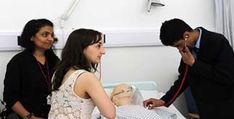Our work hopes to encourage school and college pupils to discover more about education, research and careers in biomedical science and healthcare. We are committed to supporting all pupils, especially those from a widening participation background, to access and engage with an excellent higher education experience.
We provide a range of activity, including school talks and visits to campus, with a focus on healthcare and research. We also look after our Pathways to Medicine peer mentoring programme undergraduate students that join the University through an access programme. Find out more about the opportunities available to students below.

Access programmes for Year 12 and Year 13 students.

More information on the UKWPMED (UK Widening Participation in Medicine) Programme.

We are a proud member of the Realising Opportunities (RO) partnership for Year 12 and 13 students. Find out more.
![A girl wearing a bright green glove holding a dental tool.]()
This year we are partnering with the Dental School’s Council to deliver an online Dentistry Summer School for Year 11 students in the Midlands.

Explore our activities for primary and secondary school students, as well as our free resources for teachers and advisors.

Find out more about our Microscopes 4 Schools competition.
![Two university students reading from cards to a group of children.]()
Find out more about the activities you can get involved with through MDS Outreach once you join the University.

Contact the team
Also in 'Outreach and Widening Participation'